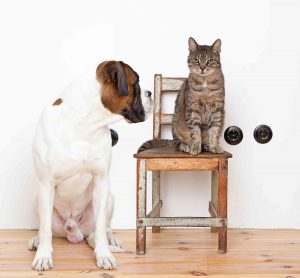Faced With a Pet Emergency, Now What?
 We understand that seeking out emergency care for a pet is a decision not made lightly among responsible pet owners. While symptoms like vomiting or diarrhea can be troubling – they could also be related to a hairball or fleeting GI distress. Other situations clearly demand immediate medical intervention. Also, many symptoms fall into a grey area that inhibits a clear understanding of the severity. When in doubt, we can help you understand what to look for in a true pet emergency and how to help your pet in need.
We understand that seeking out emergency care for a pet is a decision not made lightly among responsible pet owners. While symptoms like vomiting or diarrhea can be troubling – they could also be related to a hairball or fleeting GI distress. Other situations clearly demand immediate medical intervention. Also, many symptoms fall into a grey area that inhibits a clear understanding of the severity. When in doubt, we can help you understand what to look for in a true pet emergency and how to help your pet in need.
Normal vs. Suspicious
Injuries sustained from a fall, fight, or accident need critical care. Bleeding from open wounds, lacerations, or deep scratches should be attended to promptly. Without the right kind of attention (such as investigating the wound on your own), additional bleeding or infection can occur. Likewise, pets should not be allowed to lick their open wounds.
Bites or scratches sustained from other animals are especially dangerous. Skin, fat, and muscle tissue can be torn apart and can become prime breeding grounds for infection.
The Trauma
Blunt trauma can result in internal damage, but it may take hours or even days for noticeable symptoms to surface. If you know or suspect your pet has suffered blunt force trauma, please call us immediately.
Is it Painful?
Animals are hardwired to hide pain as a method of self-preservation. If you observe your pet pacing, panting excessively without exertion, or increased heart rate, it’s time to seek help.
Likewise, animals in pain will avoid being touched or approached by people who are normally very close. It’s critical to handle your pet very delicately; as a defense mechanism, animals in pain tend to bite.
Other Signs of a Pet Emergency
Another common reason for pet emergency care is poisoning. Toxins are everywhere – even at home – and can have disastrous effects on your pet’s health. Human medications, certain foods, cleaning products, and more are all potential risks for your pet. Check out the Pet Poison Helpline for a list of potentially dangerous products, plants, and foods.
Time in a Pet Emergency
Every passing moment counts in a pet emergency. Even if you’re not fully convinced that the hairball your cat’s been working on for the past 20 minutes is harmless, call us. We’re always here to address your concerns and answer questions.
If your pet has difficulty breathing, problems urinating or defecating, or persistent vomiting or diarrhea, stay calm and call us. Any of the following also require attention:
- Eye injuries
- Disorientation
- Collapse or seizures
- Swollen abdomen
- Vomiting blood
- Broken bones
- Unconsciousness or changes in heart rate
We will guide you through first aid, transport, and what you should bring with you, such as the suspected toxin or physical evidence of the fight with another animal.
We’re open every day, but when pet emergency care is needed after hours, please contact VERG Brooklyn or another recommended clinic.

